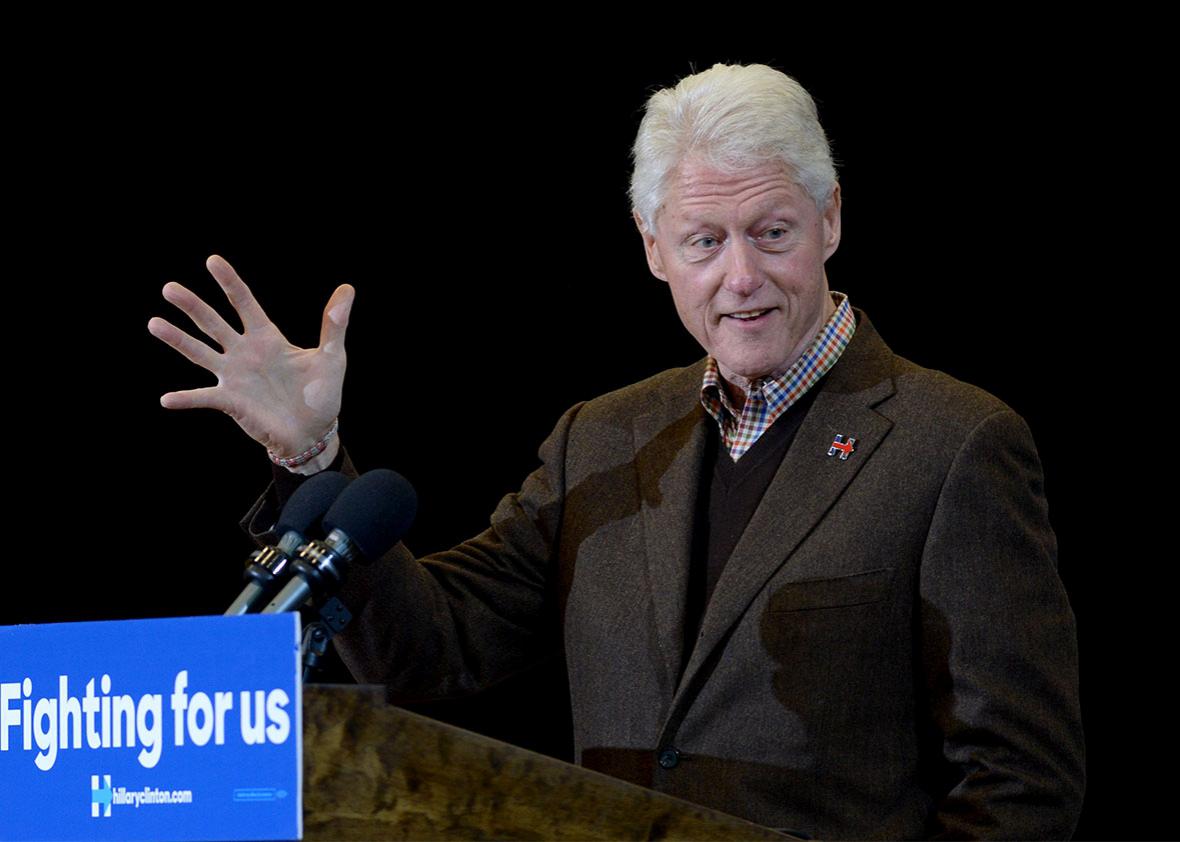CONCORD, New Hampshire—Bill Clinton is trying to make sense of what is going on. Specifically with this business about how Hillary Clinton is nearly tied with Sen. Bernie Sanders in Iowa and trailing him by as many as 27 percentage points in New Hampshire. One imagines the popular former president fantasizing about going nuclear on Sanders and all that he and his band of feel-good millennials stand for. But we’re not there yet.
“I want to begin by saying that I know there’s a hard fight here,” Clinton said at the beginning of his rally in Concord, New Hampshire on Wednesday, his third visit to the state since he recently began campaigning, “and I know we’re running against one of your neighbors.” (Lowering expectations by noting that Sanders represents Vermont, and that’s probably the only reason why Hillary could/will lose here? Check.) Clinton then began to outline “what I think is goin’ on.”
A Bill Clinton explanation of what’s goin’ on is rarely a terse affair. The condensed version is a 30-minute variety show relaying macroeconomic trends, old stories about New Hampshire voters, data about the effects of certain chemicals on the brain, walkthroughs of the financial collapse, considerations of how to win the hearts and minds of Muslims to whom radicalization represents an appealing option, wage gains and losses over the past 30 years, folksy jokes, and so on.
The message Clinton is trying to sell on behalf of his wife is one that’s lately out of fashion: that the country needs a pragmatic progressive, ready to serve as president on day one, to build on the foundation of meaningful gains that President Obama has laid in place over the past seven years. Democrats do not, by contrast, need to return to the beginning and start out on a more leftist trajectory, because that’s never going to happen, and the opportunity costs of trying are too high.
“We don’t need more gridlock in Washington,” he said during his presentation. “We can’t afford to waste a year or two.”
He was speaking specifically about wasting a year or two on the relitigation of health care reform. The Clinton camp has cleaned up its act against Sanders’ single-payer health care proposal following a ham-fisted deployment last week. The Republicanesque talking points about how Sanders is a loon who wants to tax you up the wazoo and take away your health care have been replaced with a more traditional center-left argument about how pushing for single-payer would be a waste of time. Clinton said explicitly that he didn’t “want to comment on the merits” of such a plan, just on the “practical reality” at hand.
“It’s a lot easier to go from 90 [percent insured Americans] to 100 and control costs with executive action,” he said, “than it is to go from 0 to 100 with a bill that has to be passed with 60 votes in a Republican Senate to break the filibuster, when we had not a vote to spare to pass Obamacare in a Democratic Senate.”
He had a few other sly digs for Sanders along the way. While discussing financial reform, he noted that “our friends in Canada, which we’ve heard a lot about in these debates, you know how great they are … Canada never separated their investment banks and their commercial banks,” but was able to withstand total financial collapse with more stringent rules against speculation. Sanders has been criticizing Hillary Clinton for not demanding a restoration of the New Deal–era Glass-Steagall law—repealed under President Clinton—that separated investment and commercial banking. Clinton also made sure to point out that “Hillary does not consider Planned Parenthood a member of the establishment,” in response to a questionably worded comment from Sanders on Tuesday.
Clinton closed with an analysis of the final moment of Sunday’s Democratic debate. Hillary Clinton had brought up the water crisis in Flint, Michigan, noting that she “sent my top campaign aide down there to talk to the mayor of Flint to see what I could do to help.” Sanders’ first reaction, though, was to call on Michigan Gov. Rick Snyder to resign. “What she always thinks about first,” Bill Clinton said, “is what do I have to do to make a difference?”
Bill Clinton is an able salesman, but he’s trying to sell the idea that Democrats need an experienced figure to push through measured reforms, during a cycle when so many voters on both sides think—rightly or wrongly—that the political system is corrupt and it’s time to burn it all down. The Clinton campaign and its top surrogates haven’t begun overtly dismissing Sanders’ theory of political change as a children’s fantasy yet. But the itch is there.
Read more of Slate’s coverage of the Democratic primary.
